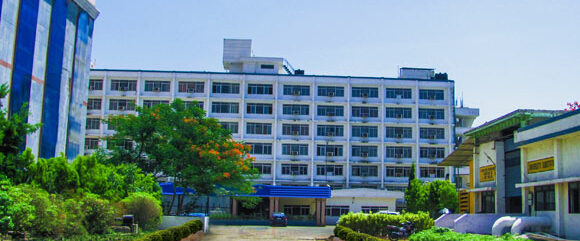Highlights of the Department
Infrastructure and Facilities
Pharmaceutical chemistry is a branch of chemistry with focus on the design, development and synthesis of pharmaceutical agents or drugs. It combines knowledge from various fields such as organic chemistry, medicinal chemistry, pharmacology and biochemistry to develop safe and effective therapeutic agent. Here are some key aspects and activities involved in department of pharmaceutical chemistry.
Key Areas of Study:
Drug Design and Discovery
- Target Identification: Determining the biological target (e.g., enzyme, receptor) associated with a disease.
- Lead Compound Identification: Screening and identifying potential compounds that can interact with the target.
- Structure-Activity Relationship (SAR): Understanding how the chemical structure of a compound influences its biological activity.
Synthesis of Drugs
- Synthetic Organic Chemistry: Developing methods to synthesize novel compounds.
- Optimization of Synthesis: Improving the efficiency, yield and purity of the synthesic process.
- Green Chemistry: Implementing environmentally friendly and sustainable synthesis practices.
Characterization and Analysis
- Spectroscopy: Techniques like NMR, FT-IR, and Mass Spectrometry to determine the structural integrity and purity of compounds.
- Chromatography: Techniques like HPLC and GC for separating and analysing compounds.
- X-ray Crystallography: Determining the 3D structure of molecules
Pharmacokinetics and Pharmacodynamics
- ADME: Studying Absorption, Distribution, Metabolism, and Excretion of drugs.
- Bioavailability: Determining the extent and rate at which the active drug reaches systemic circulation.
- Mechanism of Action: Understanding how drugs exert their effects on the body at the molecular level
Computational Chemistry
- Molecular Modelling: Using computer simulations to predict how drugs will interact with their targets.
- Quantitative Structure-Activity Relationship (QSAR): Using statistical models to predict the activity of new compounds based on their structure.
Outcome:
Development of New Drugs
- Innovative Therapies: Pharmaceutical chemistry leads to the creation of new medications that can treat previously untreatable or poorly managed diseased conditions.
- Targeted Treatments: The development of drugs that specifically target disease mechanisms, leading to more effective and personalized treatments.
- Combination Therapies: New drug combinations can be developed to enhance efficacy and reduce resistance, especially in complex diseases like cancer and HIV.
Improvement of Existing Medications
- Enhanced Efficacy: Optimization of existing drugs to increase their effectiveness.
- Reduced Side Effects: Modifying drug structures to minimize adverse effects.
- Improved Formulations: Developing better delivery methods, such as sustained-release formulations, that improve patient compliance and outcomes.
Better Understanding of Disease Mechanisms
- Biochemical Insights: Studying how drugs interact with biological systems provides deeper understanding of disease processes.
- Molecular Targets: Identification of new molecular targets for drug development, paving the way for novel therapeutic approaches.
Personalized Medicine
- Tailored Therapies: Development of drugs based on individual genetic profiles, leading to personalized treatment plans.
- Pharmacogenomics: Understanding how genetic differences affect drug response, leading to safer and more effective medication use.
Global Health Impact
- Access to Medicines: Efforts to develop affordable and accessible medications for global health issues, particularly in developing countries.
- Combatting Resistance: Development of new antibiotics and antivirals to combat resistance issues, ensuring continued effectiveness of treatments
Computational Tools and Software’s:
MOE (Molecular Operating Environment) Molecular Operating Environment (MOE) is a comprehensive software platform developed by Chemical Computing Group (CCG) that integrates visualization, modelling, and simulation capabilities for the study of molecular structures and properties. MOE is widely used in various fields such as pharmaceutical chemistry, materials science, and bioinformatics.
Key Features
- Molecular Dynamics Simulation studies,
- DFT Studies (Density Functional Theory)
- Molecular Docking
- Pharmacophore modeling and QSAR
CAREER PATHWAY FOR M.PHARM
Expanding Horizons with an M. Pharm in Pharmaceutical chemistry
A Master of Pharmacy (M. Pharm) in Pharmaceutical Chemistry offers a unique blend of advanced knowledge in chemistry, biology and pharmacology. This interdisciplinary field is vital for the development of new drugs, improving existing medications, and understanding the interaction of chemicals within biological systems. Pursuing M. Pharm in Pharmaceutical Chemistry can open doors to a range of exciting career opportunities and contribute significantly to advancements in healthcare.
Academic and Research Opportunities
Advanced Knowledge and Skill Development
- In-Depth Learning: The M. Pharm curriculum covers extensive topics such as drug design and development, medicinal chemistry, and pharmacokinetics. Students gain a thorough understanding of the chemical nature of drugs and their biological effects.
- Research Proficiency: Students engage in cutting-edge research projects, learning to apply theoretical knowledge to practical problems. This hands-on experience is invaluable for those aiming to pursue a Ph.D. or a research career.
Research and Development (R&D)
- Innovative Drug Discovery: Graduates can work in R&D departments of pharmaceutical companies, contributing to the discovery of new drugs. Their expertise is crucial in identifying potential compounds and optimizing their properties.
- Academic Research: Opportunities in academic institutions allow graduates to conduct independent research, often leading to ground breaking discoveries in pharmaceutical sciences.
Jobs for M. Pharm in Pharmaceutics Chemistry
- Research and Development (R&D) Scientist
- Medicinal Chemist
- Process Development Scientist
- Analytical Chemist
- Quality Control (QC) Analyst
- Quality Assurance (QA) Manager
- Regulatory Affairs Specialist
- Lecturer/Professor
- Research Scientist
- Lecturer/Professor
- Research Scientist
- Contract Research Organization (CRO) Scientist
- Pharmaceutical Consultant
- Start-Up Founder
- Patent Examiner
- Intellectual Property Consultant.
Research Projects
Student Projects
All students are required to complete the project as per the curriculum. Every year, in the PG and Ph.D. programs, a minimum of five students learn about individual projects or collaborations with industry and perform projects in the field of Pharmaceutical chemistry. Our department, with more than 15 publications, represents the Sustainable Development Goals (SDGs).
Publications on SDGs
- RAC advances impact factor 3.9
- Journal of chemical physics impact factor 2.9
- Beni-Suef University Journal impact factor 3.5
- Journal of Biomolecular Structure and Dynamics 4.4
- Journal of King Saud University-3.8
















